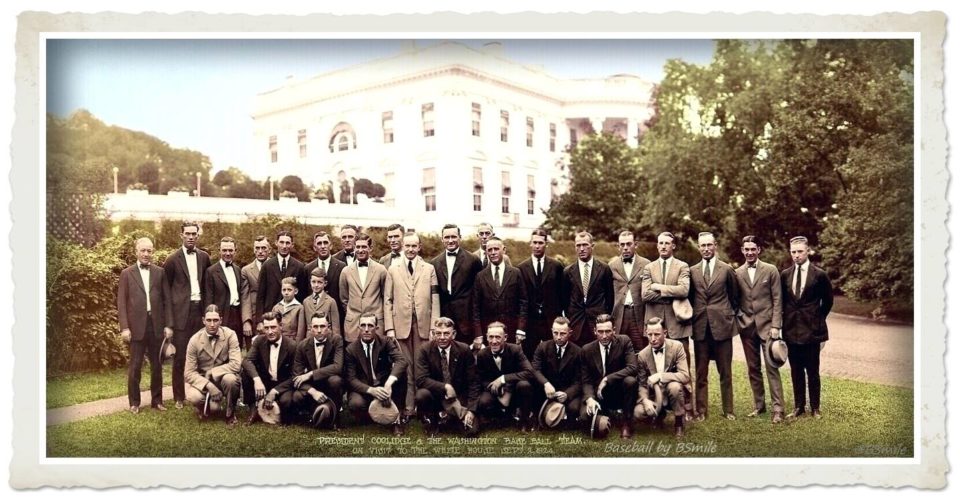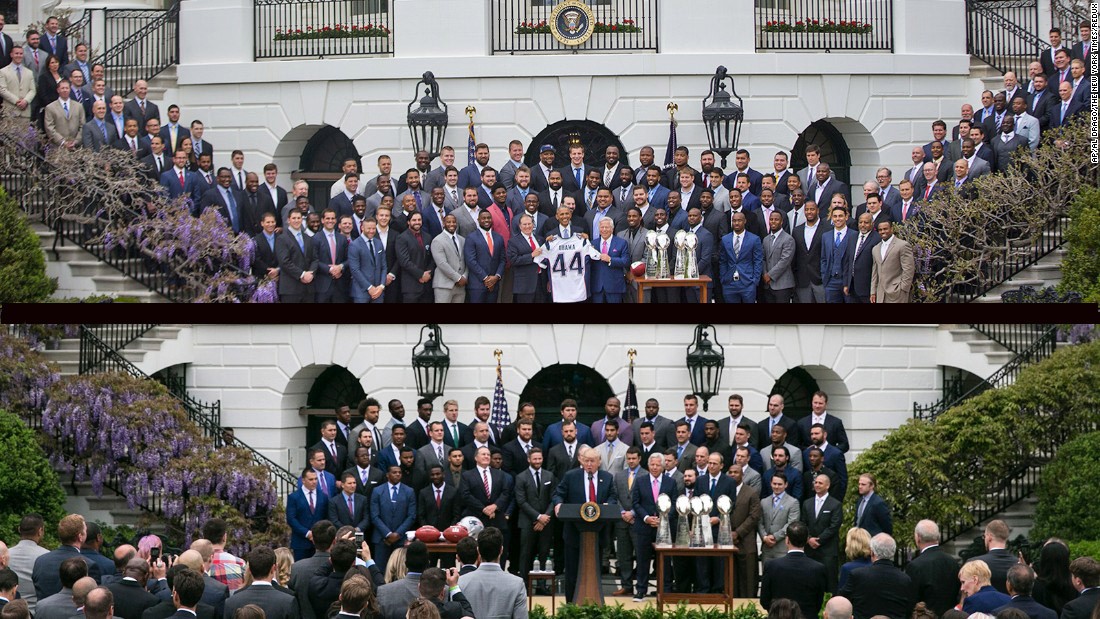For many years, the reigning champions of each major professional sports league in America would pay a visit to the White House as part of their championship celebration. The first instance occurred in 1865, with President Andrew Johnson played host to the Brooklyn Atlantics and Washington Nationals amateur baseball teams. Major League Baseball first made it a tradition for the World Series Champion in 1924, with the NBA following suit in 1963, the NFL joining in in 1980, and the NHL becoming the last of the "Big Four" professional leagues to visit, in 1991. Throughout the years, more and more champions, from both the professional and collegiate level, and it has been a regular occurrence for the last few decades. In recent years, however, what was once considered to be an honor has now become an opportunity for protest.
A player's absence from a presidential visit hasn't always been for political reasons, sometimes it comes from a place of ambivalence. In 1984, when the Boston Celtics were invited to Ronald Reagan's White House, star player Larry Byrd declined to show, stating that "[i]f the President wants to see [him], he knows where to find [Byrd]." Similarly, in 1991 Michael Jordan did not join the rest of the Chicago Bulls on their trip to meet with President George H.W. Bush after their first championship, deciding instead to play golf. These instances seem to be less about a political message, and more about an athlete really not caring about a meeting with the president.
In more recent years, however, declining an invitation from the president after a championship win has become more politically loaded and has evolved into a form of protest on the athlete's part. The first real instance of an athlete using the presidential invite as a form of protest occurred in 2012, when Boston Bruins goalie Tim Thomas refused to join his team in a visit to Obama's White House. In a statement released on NHL.com, the reigning Vezina and Conn Smythe winner stated that he would not attend the ceremony because he felt that he did not agree with the direction that the government was heading. Thomas was sure to explain that he was not trying to make a political message, but was instead based on his feeling that the government as a whole, regardless of party, had "grown out of control" and was "in direct opposition of the Constitution". Despite his attempt to make his protest a governmental issue rather than a political one, Thomas was lambasted by the media, with many saying that this decision was a case of him putting himself before the team, and one sports broadcaster even decrying him as a racist, using the names of his children as evidence. While Thomas said he was merely exercising his right as an American citizen to protest, his absence from the ceremonies drew nothing but ire from the media.
With the coming of the polarizing Trump administration came a massive uptick in the instances of championship protests. After winning the 2017 Super Bowl, the New England Patriots were the first team from the Big Four to be offered an invitation to the White House, but many members of the team chose to opt out of the visit. Some players stated that they did not feel it necessary to attend twice in three years, as the team had just won the Super Bowl a few years prior, but others cited Trump and his controversial political stances and policies as their reason for not attending. Defensive back and captain Devin McCourty told Time magazine that he would not attend because he "[didn't] feel accepted in the White House." McCourty went on to say that "[w]ith the president having so many strong opinions and prejudices [he] believe[s] certain people might feel accepted there while others won't." Trump's troubles with NFL champions didn't end there, as this year's Super Bowl Champion Philadelphia Eagles proved to be a fiasco as well. According to a press release posted to whitehouse.gov, Trump initially extended an invitation to the organization, but after learning that fewer than ten Eagles players would attend the ceremony, he rescinded the invitation and turned it into a celebration of the American flag. Trump's attempt at saving face did not sit well with the public, who felt that it was a political stunt and a mishandling of the situation.
Trump rescinding the Eagles' invitation wasn't his first instance of bumbling a visit protest situation. In 2017, the NBA Champion Golden State Warriors were working on plans to visit the White House when star player Steph Curry stated that he would rather not attend, but that the team would come to a decision and they would go from there. Upon hearing that Curry was hesitant to attend, Trump tweeted that it should be a great honor to attend the event, and due to Curry's hesitation the invitation was revoked not only for him but for the whole team. This decision left a bad taste in the mouth of NBA players, and members of both teams who maid it to the finals the next year said that they would not accept an invitation should it be extended. When the Warriors ultimately won their second straight championship, they instead spent their trip to Washington D.C. taking local schoolchildren to an African-American history museum rather than a visit to the White House.
What began as a celebration and gesture of goodwill between the American president and the sporting world has now become a stage for political protest. With athletes becoming more and more a part of our daily lives and cultural conscious, they are beginning to use their time in the limelight to call issues to the forefront, and many have seen these presidential visits as their way of doing so.
The World Series Champion Washington Senators visiting
President Calvin Coolidge in 1925. (Baseball History Comes Alive)
A player's absence from a presidential visit hasn't always been for political reasons, sometimes it comes from a place of ambivalence. In 1984, when the Boston Celtics were invited to Ronald Reagan's White House, star player Larry Byrd declined to show, stating that "[i]f the President wants to see [him], he knows where to find [Byrd]." Similarly, in 1991 Michael Jordan did not join the rest of the Chicago Bulls on their trip to meet with President George H.W. Bush after their first championship, deciding instead to play golf. These instances seem to be less about a political message, and more about an athlete really not caring about a meeting with the president.
In more recent years, however, declining an invitation from the president after a championship win has become more politically loaded and has evolved into a form of protest on the athlete's part. The first real instance of an athlete using the presidential invite as a form of protest occurred in 2012, when Boston Bruins goalie Tim Thomas refused to join his team in a visit to Obama's White House. In a statement released on NHL.com, the reigning Vezina and Conn Smythe winner stated that he would not attend the ceremony because he felt that he did not agree with the direction that the government was heading. Thomas was sure to explain that he was not trying to make a political message, but was instead based on his feeling that the government as a whole, regardless of party, had "grown out of control" and was "in direct opposition of the Constitution". Despite his attempt to make his protest a governmental issue rather than a political one, Thomas was lambasted by the media, with many saying that this decision was a case of him putting himself before the team, and one sports broadcaster even decrying him as a racist, using the names of his children as evidence. While Thomas said he was merely exercising his right as an American citizen to protest, his absence from the ceremonies drew nothing but ire from the media.
Tim Thomas addressing the media. (NESN)
With the coming of the polarizing Trump administration came a massive uptick in the instances of championship protests. After winning the 2017 Super Bowl, the New England Patriots were the first team from the Big Four to be offered an invitation to the White House, but many members of the team chose to opt out of the visit. Some players stated that they did not feel it necessary to attend twice in three years, as the team had just won the Super Bowl a few years prior, but others cited Trump and his controversial political stances and policies as their reason for not attending. Defensive back and captain Devin McCourty told Time magazine that he would not attend because he "[didn't] feel accepted in the White House." McCourty went on to say that "[w]ith the president having so many strong opinions and prejudices [he] believe[s] certain people might feel accepted there while others won't." Trump's troubles with NFL champions didn't end there, as this year's Super Bowl Champion Philadelphia Eagles proved to be a fiasco as well. According to a press release posted to whitehouse.gov, Trump initially extended an invitation to the organization, but after learning that fewer than ten Eagles players would attend the ceremony, he rescinded the invitation and turned it into a celebration of the American flag. Trump's attempt at saving face did not sit well with the public, who felt that it was a political stunt and a mishandling of the situation.
Comparison of the Patriots' 2015 and 2017 White House Visits. (CNN)
Trump rescinding the Eagles' invitation wasn't his first instance of bumbling a visit protest situation. In 2017, the NBA Champion Golden State Warriors were working on plans to visit the White House when star player Steph Curry stated that he would rather not attend, but that the team would come to a decision and they would go from there. Upon hearing that Curry was hesitant to attend, Trump tweeted that it should be a great honor to attend the event, and due to Curry's hesitation the invitation was revoked not only for him but for the whole team. This decision left a bad taste in the mouth of NBA players, and members of both teams who maid it to the finals the next year said that they would not accept an invitation should it be extended. When the Warriors ultimately won their second straight championship, they instead spent their trip to Washington D.C. taking local schoolchildren to an African-American history museum rather than a visit to the White House.
Warriors Players at the African-American History Museum. (Youtube)
What began as a celebration and gesture of goodwill between the American president and the sporting world has now become a stage for political protest. With athletes becoming more and more a part of our daily lives and cultural conscious, they are beginning to use their time in the limelight to call issues to the forefront, and many have seen these presidential visits as their way of doing so.



Comments
Post a Comment